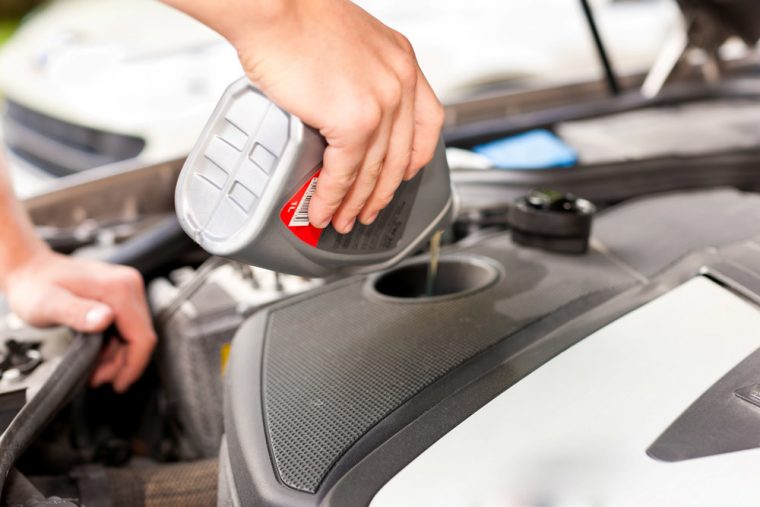9 Critical Car Fluids and When to Replace Them
Your vehicle needs a wide variety of fluids to function properly. Here’s a quick and easy guide to help you know when to check and replace them.
More Essential Maintenance: Find the right tires for your vehicle
Gasoline
Let’s start with the basics. Conventional combustion engines require gasoline to run. While refueling can be inconvenient, it’s in your best interests to keep your vehicle’s tank fairly full. In order to function properly, your car’s fuel pump needs to be fully submerged in gasoline. That means keeping your tank at least one-quarter full — preferably more. If you let your car run on empty for too long, exposure to air can cause your fuel pump to prematurely degrade, leading to costly repairs. It’s also a good idea to keep a fairly full tank to prevent fuel-line freeze ups during the winter.
Engine oil
Engine oil keeps your vehicle’s engine running smoothly — and without enough lubricant, the precision moving parts in the engine would grind against each other, causing them to wear out and produce metal shavings that can jam up the works. Check your oil every few weeks. Its level should be within the two dots on the dipstick, and its color should be closer to amber than coffee. If it’s dark or gritty, it’s definitely time for an oil change. Most experts recommend getting an oil change every 3,000-5,000 miles, but when in doubt, follow the recommendations in your vehicle owner’s manual.
Transmission Fluid
Transmission fluid is a reddish liquid that lubricates the complex, precision gears inside of your vehicle’s transmission. If it’s running low, your vehicle could suffer from severe transmission damage — which is costly and time-consuming to have fixed. Luckily, transmission fluid is easy to maintain — just check it about every six months, and have it flushed every 30,000 miles, or as recommended by your car’s manufacturer.
Brake Fluid
When you hit the brakes, this essential fluid gives you the stopping power you need. If it gets too low, you may experience vibration when braking, difficulty depressing the brake pedal, and the ABS system activating when it’s not needed. To maintain this fluid, check it every time you get an oil change. If it’s low, top it off, but if it smells burnt, it’s time to have it bled and changed. Even if it doesn’t smell foul, it’s a good idea to have it changed every few years. Brake fluid degrades over time, which can damage your braking system and lead to it overheating.
Coolant
Known as radiator fluid, antifreeze, or coolant, this fluid is essential for your vehicle’s temperature regulation. Therefore, whether it’s blazing hot or freezing cold, it’s essential to keep your vehicle’s coolant filled properly. Check it at least twice a year — before summer and winter. However, it doesn’t hurt to glimpse at it more frequently. Just make sure the car is cool when you check — if it’s been running, you could get scalded by hot fluid. And when it’s time to top off the reservoir, be sure to choose a coolant that matches your vehicle’s make and model. And to keep your radiator performing its best, flush it every five years or 100,000 miles.
Power steering fluid
If you’ve ever driven an older vehicle, you’re probably glad to have power steering in your modern car. Keep this convenience by checking and if necessary, refilling, the power steering fluid once per month. When your vehicle is running low, you may experience difficult or noisy steering. It’s also a good idea to have the fluid completely changed every two years or 75,000 miles.
Differential fluid
Here’s one you don’t hear about much. Also known as gear fluid, this liquid fills the front and rear axles of your vehicle. When it’s too low, you’ll notice a burning smell coming from the differential, difficulty changing gears, or slipping gears while shifting. This fluid reservoir doesn’t have a dipstick, but if you can dip your finger in and find oil, it’s sufficient. Typically, differential fluid is changed every 30,000-60,000 miles, depending on manufacturer recommendations. But don’t expect to DIY this project — it’s a difficult task that needs to be performed by an expert technician.
Air conditioning refrigerant
If your car’s climate control isn’t feeling as crisp as it could, consider topping up its refrigerant. Other signs include your vehicle leaking a thin oil from under the cabin, or a clicking noise from the air conditioning system. To keep your AC from blowing hot air, this system typically needs to be recharged every 1-2 years.
Windshield washer fluid
Washer fluid is great for getting bird droppings and bug splatter off of your windshield. Depending on where you live, you may need to switch to freeze-resistant fluid during the winter months. Just don’t fill up the washer fluid reservoir with water — that can encourage bacterial growth that can spray through your vents and make you ill.
Why Choose Certified Service? Get the right care for your vehicle
Need to figure out why your car is leaking? Check out our handy guide.
Kimiko Kidd is a native Daytonian. She graduated from Wright State University with degrees in environmental science and sociology. She loves her trusty old Honda Civic, but dreams of owning a 1974 Ford Falcon XB with a custom paint job and a vintage Kawasaki Z1000. In her free time, Kimiko can be found watercolor-painting, baking muffins, collecting rocks, playing old-school Nintendo games, writing her novel, sewing stuffed animals, and cosplaying as her favorite Mad Max characters. See more articles by Kimiko.


